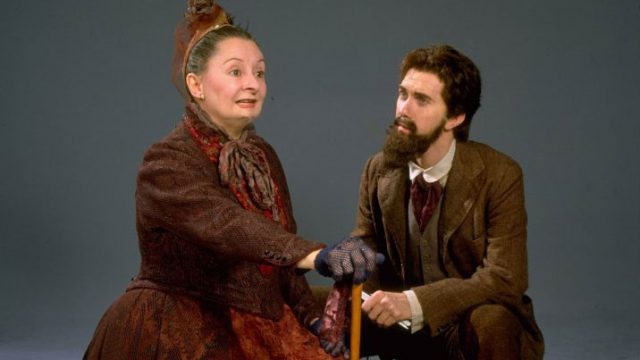I go back and forth on whether Sweeney Todd or Sunday In The Park With George is my favorite musical – they both satisfy my love of catharsis, whether bloody or internal, and for characters estranged from traditional norms. Sondheim has always been fascinated by people whose fixations make society uncomfortable. His musical Passion was even laughed at by audiences because they saw Fosca, the chronically ill and neurotic woman in love with a reluctant army captain, as ridiculous. These characters often fall apart or are eventually consumed by their demons. Sunday is one of the few of his oeuvre where this outsider, at least by proxy through his grandson, is able to reconcile the inner world with the outer, to see the life outside of his art as having profound meaning. (George at least reaching “And the way you catch the light/and the care, and the feeling/And the light!” in “Move On” is like an anti-“Epiphany”, the artist seeing the non-artistic as vital and powerful.)
That reconciliation is threaded through the play – the book and lyrics suggest Dot and the eventual inhabitants of the painting have their own deeper creative impulses and ideas, their interests and speculations as valid as George’s art. Dot chooses how to apply her makeup, paired with George’s obsessive techniques in “Color & Light”; Marie observing that George put Dot front and center in the painting (“He must have loved her so much”). The male artists of the play rarely notice the creative power of the wives and mothers around them yet respond to it all the same – George is fascinated by Dot’s ability to look into herself, to make herself a work of art. “Forever with that mirror…”
The song “Beautiful” is one of the most profound explications of the domestic and creative feeding one another. George’s mother longs for a likely false version of the past, for the view of the Park before the Eiffel Tower, when George was only a boy. George dismisses most of her memories as lies – he never swam, he didn’t have any male friends, there were no trees around there before the Tower was built. But he becomes swept up in her reverie anyway, as she begs him to draw the world before it’s destroyed by progress, by the crawl of time. His mother at last sees his art’s value, to preserve what once was: “Quick, draw it all/Georgie/Sundays disappearing, all the time/you make it beautiful.”
But George tells her, as the melody changes to a minor key, unpredictable piano pattern, that “Pretty isn’t beautiful, Mother/Pretty is what changes/What the eye arranges/Is what is beautiful.” The melody soars again as she joins in counterpart – they are both rhapsodized by their visions of what was and what can be. The old wish for what was, the young crave what will come, what they can change. (“You watch while I revise the world!”) George futilely asks his mother to “Look!” to see what she just can’t. But for that moment the two of them perceive their own versions of the Sublime, at different periods and different worlds. They are alone together with the transcendent.

